Select Language
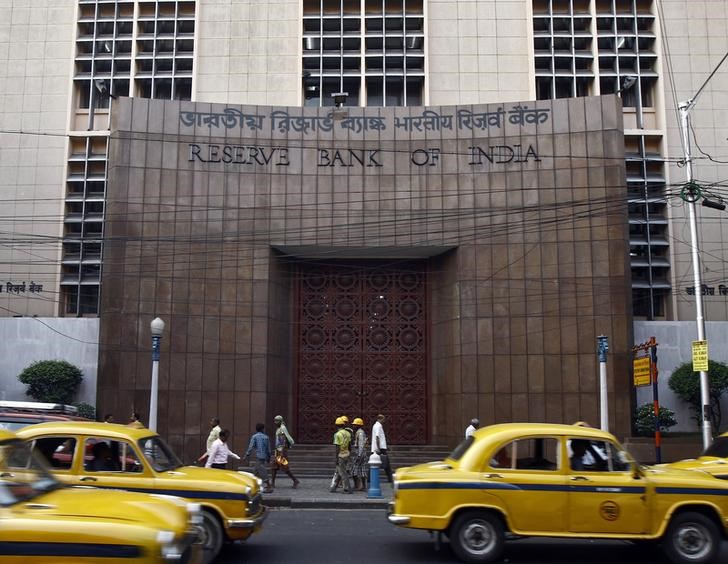
Investing.com-- The Reserve Bank of India kept interest rates steady on Thursday as widely expected, and said that it will continue to focus on keeping inflation in check amid accelerating economic growth in the country.
The RBI kept its policy repo rate at 6.5% for a fifth consecutive meeting, after having signaled an end to its hiking cycle in mid-2023.
Governor Shaktikanta Das said in a livestream that the bank will continue to keep policy tight in order to bring inflation more in line with its 4% target. Das also noted that the Indian economy was expanding at a rapid pace, and would likely continue to outpace its global peers in the coming years.
The RBI Governor forecast real gross domestic product (GDP) for the current fiscal year to March 31, 2024, at 7.3%. Real GDP growth for fiscal year 2025 is projected at 7%, with the Indian economy set to vastly outpace its global peers.
India was the fastest-growing major economy over the past two years, amid increased government spending and foreign investment. Consumer spending, particularly in India’s urban centers, was also a key driver of growth.
But Das noted persistent risks from inflation, and stressed on the need to keep inflation balanced and under control to facilitate continued economic growth.
The RBI’s decision comes just a few days before Indian consumer price index inflation data, which is expected to show price pressures remaining sticky and well above the RBI’s 4% annual target in January.
Food price inflation- particularly vegetables and grains- has remained a key point of contention for Indian inflation, after irregular monsoons through 2023 sparked shortages in some parts of the country.
“The inflation trajectory going forward will be shaped by food inflation, about which there is considerable uncertainty,” Das said.
Das said that CPI inflation was projected at 5.4% for the current fiscal year, and was projected at 4.5% for fiscal 2025, assuming a stable monsoon.
The Indian rupee rose 0.1% after the RBI decision, while the Nifty 50 stock index tread water.

By Joyce Lee and Cynthia Kim
SEOUL (Reuters) - Legislation aimed at increasing South Korea's import-export lending to support huge new defence sales has stalled amid partisan deadlock ahead of a divisive parliamentary election, officials and analysts said.
South Korea's ruling and opposition parties have both introduced bills to boost the state bank's equity capital to 25 trillion-35 trillion won ($19 billion-$26 billion), raising the lending limit to 10 trillion-14 trillion won, as the country seeks to expedite Poland's $22 billion weapons purchase.
The sale is a key part of South Korea's plan to become the world's fourth-largest defence exporter by 2027. But under current law, the Export-Import Bank of Korea cannot lend more than 40% of its roughly 15 trillion won of equity capital, or about 6 trillion won, to a single borrower.
The state bank already provided about 6 trillion won in credit during the first phase of the deal with Poland, South Korea's biggest-ever weapons sale.
Legislators have not yet agreed to move any of the limit-raising bills forward before an extraordinary parliament session that starts Feb. 19, because of political skirmishing before an April 10 general election.
"There won't be a chance to pass the bill for at least some months (if not passed in February)," said a parliamentary official, who was not authorised to speak on the matter and declined to be identified. "Given the involvement of sensitive export talks and schedules, it needs to be now."
A change in Poland's leadership last year raised questions over whether Warsaw would scrap previously signed procurements. But such a move is unlikely because it could cause massive diplomatic fallout, said Abhijit Apsingikar, an aerospace and defence analyst at GlobalData.
If there is no credit line to finance procurement from South Korea, however, it could put the unsigned procurement of 308 K9 howitzers and 820 K2 Black Panther tanks in jeopardy, he said.
An audit of modernisation contracts is under way at the Polish Ministry of National Defense, taking into account the needs of the Polish Army and the methods and sources of their financing, Poland's defense ministry said in a statement to Reuters.
"We are in contact with all bidders with whom we already cooperate, as well as with those who are interested in cooperation within the arms industry," the ministry added.
DEFENCE DEALS AT RISK
President Yoon Suk Yeol has prioritised big-ticket exports that need financing, such as defence and nuclear power plant sales, as he enters the third year of his five-year, single-term presidency.
South Korean defence firm LIG Nex1 won a $3.2 billion deal to export a mid-range surface-to-air missile defence system to Saudi Arabia, South Korea's Ministry of National Defence said on Tuesday.
"South Korea's economy relies heavily on exports, and defence exports is a growing to be key part of it, so it is essential to raise that capital limit to support major export deals," said a government official with direct knowledge of the matter, speaking on condition of anonymity because of the sensitivity of the issue.
In July 2022, Poland reached a basic agreement with South Korea to buy arms that included 48 FA-50 fighter jets from Korea Aerospace Industries, 672 K9 howitzers from Hanwha Aerospace and 1,000 K2 tanks from Hyundai (OTC:HYMTF) Rotem.
The next month, Poland signed contracts for the first phase of the agreement, worth 17 trillion won, for which arms including 180 K2 tanks and 212 K9 howitzers are being produced and delivered.
But the second phase, estimated by Korean media to be worth about 30 trillion won ($22.52 billion), has yet to be completed, partly because the Polish government has taken issue with the lack of funding from state-backed export credit agencies (ECAs), said four defence sources with knowledge of the matter.
Seoul has reduced Poland's financing hurdles with five local banks willing to provide a syndicated loan, but the Polish government prefers ECAs - they are seen as more stable because they have government backing, and have lower interest rates, the sources said.
At least one financing agreement for Hanwha Aerospace's second contract hasn't been reached, according to the sources.
Under the contract, the financial agreement with Hanwha must be reached by the end of June 2024, the sources said. They declined to be identified because they were not authorised to speak to the media.
Hanwha Aerospace declined to comment.
($1 = 1,331.9700 won)
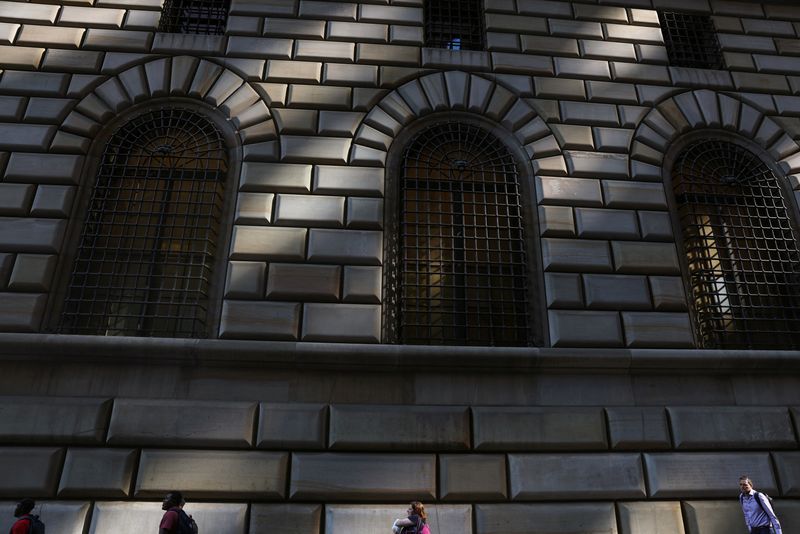
By Michael S. Derby
NEW YORK (Reuters) - A top Federal Reserve Bank of New York staffer said Wednesday efforts to shrink the size of the central bank’s balance are proceeding smoothly and officials are closely watching for market signals that it’s time to stop the draw down.
“Balance sheet reduction has been proceeding as planned and reserve supply remains above ample,” which signal markets are still enjoying plenty of liquidity, said Jule Remache, Deputy System Open Market Account manager and head of Market and Portfolio Analysis for the bank, in a speech text prepared for the Women in Fixed Income Conference in New York. The head of the System Open Market Account, who is responsible for implementing Fed monetary policy directions, is Roberto Perli.
Remache was discussing the outlook for the Fed's work to trim the size of its holdings, which more than doubled to a peak of $9 trillion by the summer of 2022 due to central bank bond buying aimed at stabilizing markets and providing stimulus to the economy. The Fed has thus far shed about $1.4 trillion from its holdings, and with the central bank nearing its first rate cut, markets are actively debating when balance sheet draw down will also stop.
Remache acknowledged a wide range of market views on that question and did not offer her own forecast. But she said in her speech that money market conditions are showing “incremental signs” of shifting in response to tighter liquidity conditions. She pointed to more volatility in short-term rates, although she noted that did not extend to the federal funds rate, the central bank’s chief tool to influence the economy.
“In the coming months, we will be monitoring money markets for emerging pressures, which may at some point indicate we’re getting closer to a level that is somewhat above ample,” the Fed official said
Remache pointed to the draw down in the size of the Fed’s reverse repo facility as evidence of the Fed’s withdrawal of liquidity. That facility has fallen from a peak of $2.6 trillion at the end of 2022 to $553 billion on Wednesday. Many see the reverse repo tool as a proxy for excessive liquidity and believe when it is near zero or close to it, the Fed will have to actively weigh stopping its balance sheet draw down.
Remache said she expects further drops in the reverse repo facility and that bank reserve levels, which have been fairly steady, will also begin to shrink.
But Remache also cautioned that various factors in the financial system argue against the Fed returning its holdings to their pre-pandemic $4.2 trillion size. The Fed’s current balance sheet size is $7.7 trillion.

By Michelle Nichols
UNITED NATIONS (Reuters) - United Nations sanctions monitors are investigating dozens of suspected cyberattacks by North Korea that raked in $3 billion to help it further develop its nuclear weapons program, according to excerpts of an unpublished U.N. report reviewed by Reuters.
"The Democratic People's Republic of Korea (DPRK) continued to flout Security Council sanctions," a panel of independent sanctions monitors reported to a Security Council committee, using North Korea's formal name.
"It further developed nuclear weapons and produced nuclear fissile materials, although its last known nuclear test took place in 2017," wrote the monitors, who also said Pyongyang had continued ballistic missile launches, put a satellite into orbit and added a "tactical nuclear attack submarine" to its arsenal.
North Korea has long been banned from conducting nuclear tests and ballistic missile launches by the 15-member Security Council. Since 2006, it has been subject to U.N. sanctions, which the council has repeatedly strengthened to try and cut off funding for its weapons of mass destruction (WMD) development.
"The panel is investigating 58 suspected DPRK cyberattacks on cryptocurrency-related companies between 2017 and 2023, valued at approximately $3 billion, which reportedly help fund DPRK's WMD development," the monitors wrote.
North Korea's mission to the United Nations in New York did not immediately respond to a request for comment on the report by the sanctions monitors. Pyongyang has previously denied allegations of hacking or other cyberattacks.
The U.N. report is due to be released publicly later this month or early next month, diplomats said.
North Korean hacking groups subordinate to the Reconnaissance General Bureau (RGB) - Pyongyang's primary foreign intelligence agency - reportedly continued with a high number of cyber attacks, the sanctions monitors said.
"Trends include DPRK targeting of defense companies and supply chains, and increasingly sharing infrastructure and tools," according to the monitors, who report twice a year to the 15-member Security Council.
LUXURY GOODS
Any further action against North Korea by the council is unlikely as it had been deadlocked for several years on the issue. China and Russia instead want the sanctions to be eased to convince Pyongyang to return to denuclearization talks.
Moscow and Pyongyang also vowed last year to deepen military relations. The U.S. has accused North Korea of supplying weapons to Russia for its war in Ukraine, which North Korea and Russia have denied.
"The panel is investigating reports from Member States about supplies by DPRK of conventional arms and munitions in contravention of sanctions," the sanctions monitors wrote.
The isolated Asian nation imposed a strict lockdown amid the coronavirus pandemic that slashed its trade and aid access, but it slowly began to re-emerge last year.
"Trade continues to recover. The 2023 overall recorded trade volume surpassed the total for 2022, accompanied by the reappearance of a large variety of foreign consumer goods, some of which could be classified as luxury items," the sanctions monitors wrote.
The sale or transfer of luxury items to North Korea has long been banned by the Security Council. Under U.N. sanctions imposed in 2017, all countries were also required to repatriate North Koreans working abroad to stop them earning foreign currency for North Korean leader Kim Jong Un's government.
"The panel investigated reports of numerous DPRK nationals working overseas earning income in violation of sanctions, including in the information technology, restaurant, and construction sectors," the sanctions monitors wrote.
They also said North Korea continues to access the international financial system and engage in illicit financial operations in violation of U.N. Security Council resolutions.

WASHINGTON (Reuters) -The U.S. Treasury Department's financial crimes unit on Wednesday proposed a long-awaited plan aimed at curbing the flow of illicit funds through American real estate markets.
The proposal, detailed by the Treasury Department's Financial Crimes Enforcement Network (FinCEN) on Wednesday, would require real estate professionals to flag suspicious activity seen in cash residential home purchases.
Title insurance companies, lawyers and certain other professionals involved in such deals would have to file reports for any non-financed sale or transfer of residential properties to an entity or trust, according to FinCEN's proposal.
If finalized, the new rule would replace a patchwork system that anti-corruption advocates have said has allowed bad actors to hide the proceeds of illicit activity by buying homes through legal entities or trusts, without financing.
Last year, Treasury Secretary Janet Yellen said that criminals for decades have anonymously hidden such ill-gotten gains in real estate, estimating $2.3 billion was laundered through U.S. real estate between 2015 and 2020.
Financial institutions have long been expected to flag suspicious activity to regulators, but cash real estate transactions generally have not been subject to such rules. The new requirements would demand real estate professionals involved in such transactions collect and report data to FinCEN about the property being sold, the seller and the beneficial owner of any legal entity receiving the property.
Officials first said in 2021 that they planned to implement such a rule.
Anti-corruption advocates applauded Wednesday's proposal.
"This draft rule sends a clear message that the U.S. plans to close off options for criminals looking to hide their ill-gotten gains in our real estate markets,” Ian Gary, executive director of the nonpartisan FACT Coalition, said in a statement.
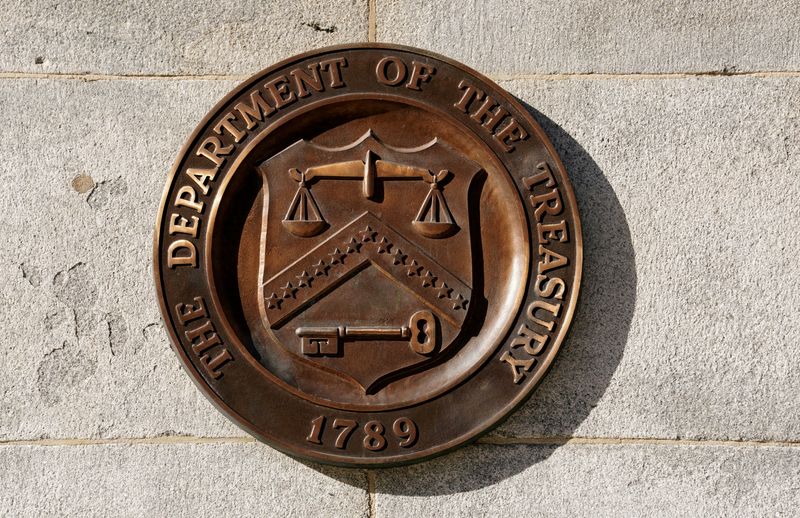
By David Lawder
WASHINGTON (Reuters) - The U.S. Treasury said on Tuesday it now estimates that $80 billion in modernization and enforcement funding for the Internal Revenue Service will yield up to $561 billion in additional federal revenue over the next decade, substantially more than previously thought, due to technology and operating improvements.
The new estimates for the 2024-2034 period, contained in a new IRS analysis, compare to a previous estimate of $390 billion and assume full implementation of the supplemental IRS funding from the 2022 Inflation Reduction Act.
The reason for the expected higher revenue is that previous estimates were limited to gains directly resulting from increased IRS enforcement staffing, but Treasury said it is now incorporating the benefits of technology improvements and enhanced services that are improving voluntary tax compliance.
The new estimate also includes the "specific deterrence effect" of taxpayers who are audited reporting additional tax liabilities in subsequent years, the Treasury said.
The new revenue estimates from Treasury come as the U.S. Senate considers border security legislation that also includes aid for Ukraine and Israel. An earlier House of Representatives proposal sought to offset that funding by clawing back $20 billion from the IRS investments.
If those funds are rescinded, the Treasury said the effect would be to reduce revenue by more than $100 billion over the decade. If Congress were to adopt the Biden administration's budget proposal to add another $29.1 billion in IRS enforcement funds in 2032 and 2033, the Treasury said the revenue gains could reach $851 billion.
The Treasury's revenue estimates also come a day before the Congressional Budget Office releases new 10-year U.S. budget deficit estimates that are expected to incorporate higher-than-forecast costs for clean energy tax credits under the Inflation Reduction Act, as well as higher interest costs on the federal debt.
The CBO had always estimated a lower amount of revenue gain than the Treasury from the IRS investments due to different modeling techniques. At the time of the Inflation Reduction Act's passage in 2022, the non-partisan budget referee agency estimated an increase of about $203 billion over the 2022-2031 period.

TOKYO (Reuters) - Toyota Motor (NYSE:TM) shares hit a record high on Wednesday after its earnings upgrade the prior day, with rivals Honda (NYSE:HMC) and Nissan (OTC:NSANY) also posting gains on expectations their solid hybrid lineups may benefit from cooling interest in electric vehicles.
Weakening momentum for battery-powered vehicles has led many overseas automakers to scale back roll-out plans for EVs or cut production targets as lower government subsidies and high interest rates make EV purchases harder for customers.
Toyota's strong financial performance in the third quarter was helped by robust demand for gasoline-electric hybrid vehicles, the world's top-selling automaker said on Tuesday.
Its shares were up 4% on Wednesday afternoon after jumping as much as 7.3% to a record high in the morning session, outperforming a 0.2% advance in the broad Topix index.
Nissan Motor's shares rose 2.9% in afternoon trade after gaining as much as 4.3% earlier. Those of Honda Motor advanced 1.3% after rising as much as 2.6% earlier.
"We think the market is now rethinking the potential of hybrid products, which are a strength of Toyota," analysts at Goldman Sachs wrote in a note released after Toyota raised its operating profit guidance by nearly 9% for the 12 months ending March 31.
The company's progress on raising prices that helped boost its earnings per vehicle was likely the biggest driver for the higher operating profit forecast, the analysts added.
Toyota's shares have risen 80% since the start of 2023, compared to a 69% rise in Honda's shares and Nissan's 47% gain over the same period.
Their gains easily eclipsed a 34% rise in the Topix over that period.
After posting its results, Toyota announced on Tuesday it would invest an extra $1.3 billion in its Kentucky plant in the United States for electrification efforts, including assembly of a three-row battery electric sports utility vehicle for the U.S. market.
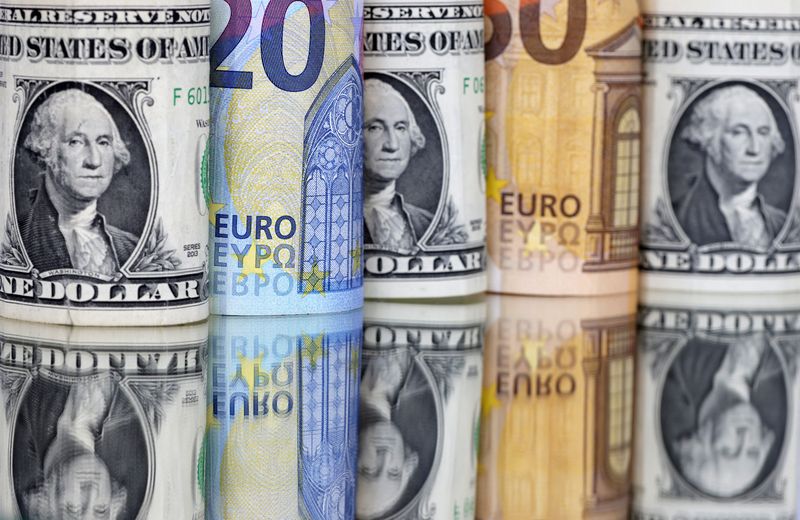
By Kevin Buckland
TOKYO (Reuters) - The dollar remained under pressure on Wednesday after retreating from a nearly three-month high against the euro in the previous session with a decline in U.S. bond yields adding to the drag.
Analysts pointed to technical factors for the dollar's pullback, following a two-day rally of as much as 1.4% against the euro after unexpectedly strong U.S. jobs data and more hawkish rhetoric from Federal Reserve Chair Jerome Powell scuppered bets for an early interest rate cut.
U.S. Treasury yields also turned down from highs overnight on solid demand at a sale of new three-year notes, removing some support for the dollar.
The dollar was little changed at $1.0755 per euro in early Asia trade on Wednesday, after retreating 0.1% on Tuesday, when it had earlier touched the strongest level since Nov. 14 at $1.0722.
The U.S. dollar index - which measures the currency against six major peers, including the euro - was flat at 104.14, following Tuesday's 0.29% slide. It had reached the highest since Nov. 14 at 104.60 on Monday.
"The U.S. dollar can be excused for being the weakest FX major on Tuesday, as it simply looks like a retracement against that bullish two-day move between Friday and Monday," said Matt Simpson, senior market analyst at City Index.
"But let us not lose sight of the fact that the U.S. dollar index retains a bullish daily structure," and a pullback could set it up for the next leg higher, he said.
The dollar was steady at 147.905 yen, after sliding 0.49% overnight. The currency pair tends to be extremely sensitive to moves in Treasury yields.
Analysts and traders highlight next Tuesday's U.S. CPI data as a key test for rate bets.
Traders are currently pricing in a 19.5% chance of a cut in March, the CME Group's (NASDAQ:CME) FedWatch Tool shows, compared with a 68.1% chance at the start of the year.
"Financial markets are in the process of recalibrating their expectations for Federal Reserve policy," said James Kniveton, senior corporate forex dealer at Convera.
"If positive economic data, particularly on inflation, persists in the U.S., the tide could turn towards earlier rate cuts, potentially weakening the greenback further."
(This story has been corrected to remove an erroneous dollar index level in paragraph 7)

LONDON (Reuters) - British construction firms turned their most optimistic in two years as the prospect of interest rate cuts raised hopes of a turnaround in the sector, a survey showed on Tuesday.
The S&P Global/CIPS UK Purchasing Managers' Index's headline measure of the construction industry improved to 48.8 in January from 46.8 in December, its highest since August 2023 although still in no-growth territory.
Economists polled by Reuters had forecast a smaller rise to 47.3.
Tim Moore, Economics Director at S&P Global Market Intelligence, said customer demand appeared close to turning a corner as the economy picked up after a weak end to 2023.
"UK construction companies seem increasingly optimistic that the worst could be behind them soon as recession risks fade and interest rate cuts appear close on the horizon," Moore said.
Construction firms said higher shipping costs pushed up prices paid for raw materials for the first time since last September.
There have been signs in other surveys that disruption to shipping in the Red Sea has delayed deliveries to British manufacturers.
Tuesday's PMI survey chimed with data from the Royal Institution of Chartered Surveyors, published last week, that showed a brighter outlook for the construction sector.
S&P Global said residential house-building continued to be the biggest drag on activity although the pace of decline was the softest since March last year.
Output in civil engineering was close to stabilisation and commercial building also shrank by less than in December, S&P Global said.
Overall new orders growth showed the slowest rate of decline since they started to contract in August 2023 and employment fell only slightly.
The wider all-sector PMI, which includes previously released services and manufacturing figures, rose to its highest in eight months at 52.6 from December's 51.7.
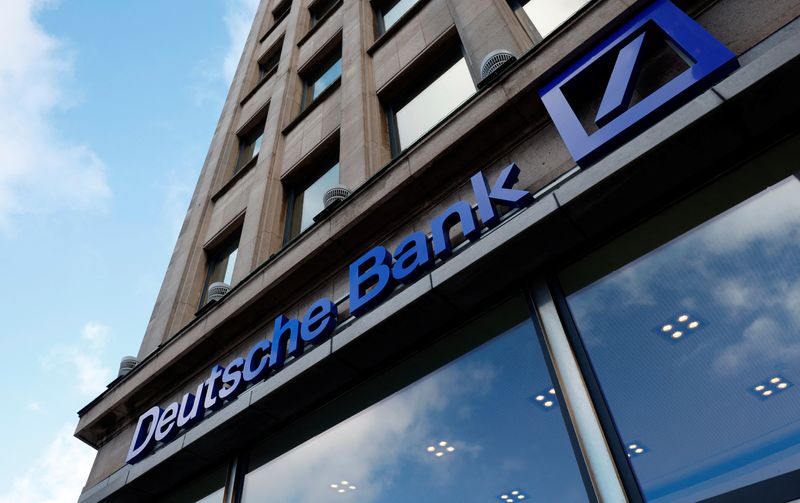
(Reuters) - Deutsche Bank no longer expect the U.S. economy to tip into recession this year, given cooling inflation and the labor market returning to a "better balance" without unemployment rising significantly.
The brokerage earlier expected the economy to enter a mild recession as the Federal Reserve tightened interest rates to tame inflation, narrowing the window for a soft landing.
Deutsche Bank said in a note on Monday that it now expects the U.S. economy to grow by 1.9% this year, on a quarterly average basis, compared with its prior forecast of 0.3%.
"Though the economy continues to face several headwinds – namely, still-tight credit conditions, rising consumer delinquency rates and a slowing labor market – the resilience to date points to a more benign slowdown in 2024 than we had previously projected," said Matthew Luzzetti, the brokerage's chief U.S. economist.
Deutsche Bank still expects the Fed to start easing interest rates from June, but now expects 100 basis points (bps) of rate cuts this year, less than its earlier expectation of 175 bps.
The U.S. economy grew a faster-than-expected 3.3% in the fourth quarter, amid strong consumer spending, with growth for the full year coming in at 2.5%, shrugging off dire predictions of a recession after the Fed's aggressive rate hikes.

